六下英语知识点汇总
六下英语1--6课词和词组

六下英语知识点Lesson l ping-pong and Basketball一.重点单词1.basket +ball→basketball篮球2.foot+ball→football 足球3.ping-pong 乒乓球4.best 最like.. best 最喜欢…→favourite最喜欢的二、知识点1. play+球类play basketball / football /ping-pong2. of all sports 所有的运动中all 所有的3.what sports do you play? (连词成句)4. ping-pong is my favourite sport.=My favourite sport is ping- pong.=I like ping-pong best.5.Can you teach me to play ping-pong? teach sb to do sth 教某人做某事6. Learn to play basketball. learn to do sth 学做某事7.I always wear a T-shirt to play ping-pong8. what about 你怎么样=How about.9. some: 肯定句.陈述句.any: 否定句.疑问句(?)Lesson 2 At the sports shop1.sports shop 体育用品店ping-pong balls 乒乓球2. dollar 美元. 复数+s yuan 元这个人民币单位不随单复数变化而变化3.Excuse me.对不起,打扰一下4. Here they are!给你5.I'll=I will6. near近(反义词:far远的)7. 四个指示代词单数this这that那复数these 这些those那些This is+单数That is+单数These are+复数Those are+复数This(对应词that)these (对应词those )8.Do you like this T-shirt or that T-shirt?or或者.还是选择疑问句:Do you want these or those?注意:实义动词like/want 不能前提,主语是第二人称you,所以用Do帮忙往前提.Lesson 3 Let's play1.basketball—basket(篮子)+ball(球)=basketball(篮球)eg:I play basketball! with Li Ming after school.2.ready /'redi/ 准备好的,(形容词)get ready for+名词/动名词为...做准备.be ready to do sth 准备做某事eg :Are you ready to read a book?你准备好读书了吗?3.learn(动词) 学习(对应词teach教)learn to do sth 学习做某事eg:Are you ready to learn to play ping-pong?你准备好学打乒乓球了吗?4 try/trai/ 试.尝试have a try 试-试.eg:let me try. 让我试一下5. throw投,抛. 现在分词为throwingeg:I'm throwing the basketball. 我正在扔篮球.6.catch(动词),抓住(反义词throw,单三catches).eg:catch the basketball! 接球.7.heavy 沉重的:繁重的.eg: The ball is heavy!球是重的.8.light 轻的;(灯) 反义词是heavyeg:This ball is light!这个球是轻的.9.difficult困难的eg: This is too difficult! 这太难了.10.10.easy /i:zi| 容易的,舒适的反义词difficult困难的eg:This is easy,这是客易的Lesson 4 Did You Have Fun?(6)1. things 事物.东西.2 each other 互相.3.player (名词) 运动员(动词play) 如:teacher( 名词) 老师(动词teach)st 上一个,最后(反义词:next 下一个)5.动词一般过去式的变化规则:①一般情况下:动词直接+ed. 如play-played want—>wanted walk -> walked watch —> watched help ->helped②以e结尾的,直接加d.如like-liked. love—>loved dance —>danced③以一个元音字母加一个辅音字母结尾的重读闭音节动词,先双写结尾字母,再ed.如shop—>shopped stop—> stopped.④以辅音字母加y结尾的动词,先把y变成i,再加一ed.如cry-cried⑤特殊情况特殊记:do—>did qo—>went buy—>boughtteach—>taught hit—> hit think—>thought am/is —>was eat —> atesee—>saw have—> had sit —> sat write —> wrote make —> maderun—>ran draw—> drew fly—> flew forget—>forgot sleep—>sleptcan—> could read — read一般现在时和一般过去时的不同之处。
最新人教版六年级英语下册各单元知识点总结归纳
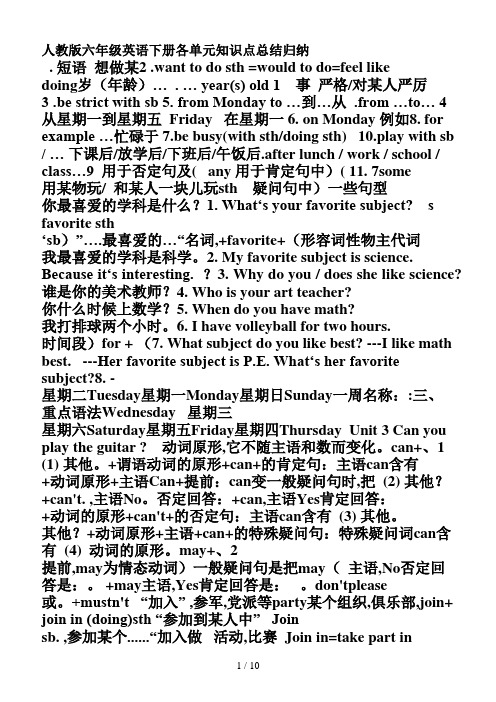
人教版六年级英语下册各单元知识点总结归纳. 短语想做某2 .want to do sth =would to do=feel likedoing岁(年龄)… . … year(s) old 1 事严格/对某人严厉3 .be strict with sb 5. from Monday to ...到...从 .from ...to (4)从星期一到星期五 Friday 在星期一 6. on Monday 例如8. for example …忙碌于 7.be busy(with sth/doing sth) 10.play with sb / … 下课后/放学后/下班后/午饭后.after lunch / work / school / class…9 用于否定句及( any 用于肯定句中)( 11. 7some用某物玩/ 和某人一块儿玩sth 疑问句中)一些句型你最喜爱的学科是什么?1. What‘s your favorite subject? s favorite sth‘sb)”….最喜爱的…“名词,+favorite+(形容词性物主代词我最喜爱的学科是科学。
2. My favorite subject is science. Because it‘s interesting. ?3. Why do you / does she like science? 谁是你的美术教师?4. Who is your art teacher?你什么时候上数学?5. When do you have math?我打排球两个小时。
6. I have volleyball for two hours.时间段)for + (7. What subject do you like best? ---I like math best. ---Her favorite subject is P.E. What‘s her favorite subject?8. -星期二Tuesday星期一Monday星期日Sunday一周名称::三、重点语法Wednesday 星期三星期六Saturday星期五Friday星期四Thursday Unit 3 Can you play the guitar ? 动词原形,它不随主语和数而变化。
小学英语6年级下册湘少版知识点汇总

小学英语6年级下册湘少版知识点汇总一、be (not) good at doing sth. (不)擅长做某事You’re good at drawing, Peter. 你擅长画画,皮特。
动名词表爱好:swimming 游泳jumping 跳跃playing table tennis 打乒乓球fishing 钓鱼drawing 画画二、want to do sth. (想要做某事)Anne wanted to skate. 安想要滑冰。
Anne wanted to learn skating. 安想要学滑冰。
Anne wanted to try again. 安想要再试一次。
动词原型:mend clothes 缝衣服read books 读书clean car 洗车fly kites 放风筝play computer games 玩电脑游戏三、look(s) like (看起来像。
)Our earth looks like this from space. 从太空看,我们的地球看起来像这样。
It looks like the sky. 它看起来像天空一样。
四、be interested in sth. (对。
感兴趣)Peter was very interested in the film. 皮特对这部电影很感兴趣。
五、What can I do? 我能做什么?(请求帮助)------I feel sick. What can I do? 我生病了。
我能做什么?------Go and see a doctor. 去看医生。
六、形容词用法(二)1、enough一词两用a.enough(形容词:足够的) + 名词------Have you got enough money? 你有足够的钱吗?------Yes, I have. / No, I haven’t. 是,我有。
/ 不,我没有。
b.形容词+ enough(副词:够…)It is useful enough. 它够用。
六年级下册英语知识点复习总结

六年级下册英语知识点复习总结六年级下册英语知识点复习总结在平平淡淡的学习中,大家最不陌生的就是知识点吧!知识点也可以理解为考试时会涉及到的知识,也就是大纲的分支。
哪些知识点能够真正帮助到我们呢?以下是店铺为大家整理的六年级下册英语知识点复习总结,欢迎阅读,希望大家能够喜欢。
小学六年级下册英语知识点:第三单元四会单词:watch—watched 看wash—washed 洗clean—cleaned打扫play—played玩 visit—visited 看望do—did last weekend上一个周末 go—went去go to a park—went to a park 去公园go swimming—went swimming去游泳go fishing—went fishing去钓鱼read—read 读go hiking—went hiking 去郊游四会句型:What did you do last weekend? 你上个周末干什么了?I played football. 我踢足球了。
Did you read books? 你读书了吗?Yes, I did.是的,我读了。
No, I didn’t. 不,我没有。
应该掌握的知识点:1、关于一般过去时一般过去时态:表示过去某一时间所发生的动作或存在的状态。
谓语动词要用一般过去式。
经常与yesterday(昨天), last week(上周), last month(上个月), last year(去年), two months ago(两个月前), the day before yesterday(前天),in 1990 (在1990年), in those days (在那些日子里)等表示过去的时间状语连用。
如: I was born in 1990. (我出生在1990年)。
When did you go to the park? (你是什么时候去的公园)。
六年级下册英语知识点梳理

六年级下册英语知识点梳理云林小学李春第一块去年六年级毕业试卷分析第二块六年级下册单元知识点第三块小学阶段考试容易出现的小作文第四块小学阶段四种时态的认识第五块3--6年级常用表达法和单元词汇的整理分享第一块去年六年级毕业试卷分析第一单元Howtallareyou?一、单元重点词汇younger(young的比较级)older(old的比较级)taller(tall的比较级)shorter(short的比较级)longer(long的比较级)bigger(big的比较级)thinner(thin的比较级)smaller(small的比较级)heavier(heavy的比较级)stronger(strong的比较级)(要注意几个特殊变化的单词二、重点句型1、问年龄,身高,体重、鞋码等Howoldareyou--I’m______kg.Howtallareyou--I’m______cmtall.Howheavyareyou--I’m_______(yearsold).Whatsizeareyourshoes?--Iwearsize37.2、比较级句型的掌握…be(amisare)+比较级than…Iam4cmtallerthanyourbrother.我比你弟弟高4cm. Iamtallerandstrongerthanyourbrother.我比你的弟弟更高更壮。
3、所有格句型的掌握Mike’sfishislongerthanSarah’s.第二单元Lastweekend一、重点单词clean打扫--cleaned(clean的过去式)打扫stay停留--stayed(stay的过去式)停留wash洗——washed洗watch看——watched看have患病——had患病sleep睡觉——slept睡觉read读——read读see看见——saw看见last上一个的yesterday昨天before在之前二、短语cleanmyroom打扫我的房间washmyclothes洗衣服stayathome呆在家里watchTV看电视goboating划船readabook读书seeafilm看电影haveacold 感冒sleep睡觉(过去式slept)climbamountain爬山cookeddinner做饭cooknoodles面条三、句子1.Howwasyourweekend你周末过得怎么样?Itwasgood/fine/ok,thankyou.很好,谢谢!2.Whatdidyoudolastweekend你上个周末干了什么?Istayedathomewithyourgrandma.我和你奶奶呆在家里.(with和谁)3.Didyoudoanythingelse你还做了其他什么事吗?Icleanedmyroomandwashedmyclothes.是的,我扫了房间,还洗了衣服。
六下英语第二单元知识点总结

六下英语第二单元知识点总结以下是六下英语第二单元的知识点总结:1. 短语归纳:have a picnic 去野餐in Spring 在春天in summer 在夏天in autumn 在秋天in winter 在冬天at the zoo 在动物园at the National Day 在国庆节in the park 在公园on the beach 在海滩上2. 句子总结:What do you usually do on the weekend? 你周末通常做什么?I usually have a picnic with my family. 我通常和家人一起去野餐。
What’s your favourite season? 你最喜欢的季节是什么?My favourite season is spring. 我最喜欢的季节是春天。
3. 语法知识:现在进行时态(be + -ing形式)的用法,表示正在进行的动作或正在发生的事情。
例如:I am having a picnic with my family. 我正在和家人一起野餐。
频度副词(always, usually, often, sometimes, never)的用法,用于描述动作发生的频率。
例如:I usually have a picnic with my family. 我通常和家人一起去野餐。
4. 重点单词:picnic 野餐weekend 周末favourite 最喜欢的season 季节5. 文化知识:了解不同国家的季节特点和常见活动,例如夏季去海滩、冬季滑雪等。
同时,也了解一些重要的西方节日,如感恩节、圣诞节等。
以上是对六下英语第二单元知识点的总结,掌握这些内容有助于更好地理解和运用该单元的英语知识。
(完整版)六年级下册英语知识点总结

(完整版)六年级下册英语知识点总结六年级下册英语知识点总结第一单元(Unit1 How tall are you?)单词:tall—taller更高的short—shorter 更矮的strong—strong更强壮的old—older年龄更大的young—younger 更年轻的big—bigger更大的heavy—heavier 更重的long—longer 更长的thin—thinne更瘦的small—smaller 更小的dinosaur恐龙hall大厅metre,meter 米than比both 两个都kilogram千克,公斤countryside乡村low—lower更低的shadow阴影,影子smart—smarter更聪明的become开始变得,变成句子:1、That's the tallest dinosaur in this hall.那是这个厅里最高的恐龙。
2、You’re older than me. 你比我大。
3、How tall are you ?你有多高?I’m 1.65 metres.我身高1.65米。
4、What size are your shoes ?你穿多大号的鞋?5、My shoes are size 37. 我穿37号的鞋。
6 、Your feet are bigger than mine .你的脚比我的大。
7、How heavy are you ?你有多重?I’m 48 kilograms .我体重48公斤。
8、It’s taller than both of us togethe r .它比我们俩加在一起还高。
应该掌握的知识点:1、形容词变为比较级的变化规则:(1)一般情况下,在形容词的词尾直接加er。
如: tall—taller short—shorter.(2)以字母e结尾的形容词,在词尾直接加r,如:nice—nicer. late—later(3)以重读闭音节结尾,且结尾只有一个辅音字母的词,先双写这个辅音字母,再加er.如:big—bigger thin—thinner fat—fatter(4)以辅音字母加y结尾的双音节形容词,先变y为i , 再加er。
人教版小学六年级英语下册期末复习各单元知识点汇集
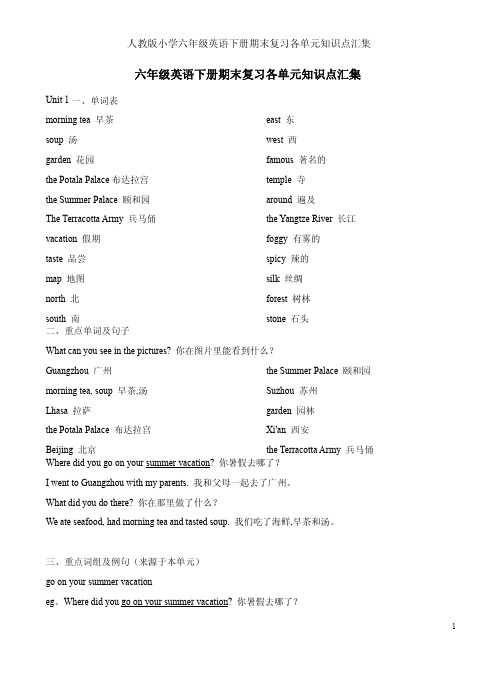
六年级英语下册期末复习各单元知识点汇集Unit1一、单词表morning tea早茶soup汤garden花园the Potala Palace布达拉宫the Summer Palace颐和园The Terracotta Army兵马俑vacation假期taste品尝map地图north北south南east东west西famous著名的temple寺around遍及the Yangtze River长江foggy有雾的spicy辣的silk丝绸forest树林stone石头二、重点单词及句子What can you see in the pictures?你在图片里能看到什么?Guangzhou广州morning tea,soup早茶,汤Lhasa拉萨the Potala Palace布达拉宫Beijing北京the Summer Palace颐和园Suzhou苏州garden园林Xi'an西安the Terracotta Army兵马俑Where did you go on your summer vacation?你暑假去哪了?I went to Guangzhou with my parents.我和父母一起去了广州。
What did you do there?你在那里做了什么?We ate seafood,had morning tea and tasted soup.我们吃了海鲜,早茶和汤。
三、重点词组及例句(来源于本单元)go on your summer vacationeg、Where did you go on your summer vacation?你暑假去哪了?eat seafood海鲜have morning tea早茶have tasted soupeg、We ate seafood,had morning tea and tasted soup.我们吃了海鲜,早茶和汤。
六年级下英语知识点总结(优秀)

六年级下英语知识点总结(优秀)六年级下册英语知识点复习总结篇一①playbadminton打羽毛球②alwaysdoyourhomework总是做家庭作业③drythedishesaftersupper晚饭后擦干盘子④atthesportsstore在运动品专卖店⑤makelunch做午饭⑥lastweek上周⑦before/afterbreakfast⑧onceayear一年一次⑨wakeup起床动词原形及过去式buy----bought(买)teach----taught(教)think----thought(想)win-----won(赢)do----did(做)lose----lost(丢失)throw----threw(扔)swim----swam(游泳)have----had(有)lie-------lay(躺)say------said(说)forget-----forgot(忘记)begin------bagin(开始)bring-----brought(带来)eat----ate(吃)go-----went(去)isam-----wasare-----were六年级英语知识点大总结篇二六年级英语知识点大总结Unit1 How can I get there?key words(重点单词)museum 博物馆 postoffice 邮局bookstore 书店 cinema 电影院hospital 医院 restaurant 餐馆crossing 十字路口 turn left/ right 左转go straight 笔直走 map 地图next to 与。
相邻 near在。
附近key sentence patterns (重点句型)1. Where is the cinema? 电影院在哪?2. It’s next to the bookstore.它紧邻书店。
3. How can I get there? 我怎样到那儿?4. Turn left at the bookstore. 在书店左转。
六年级英语下学期(PEP人教版)全册单元知识点复习资料
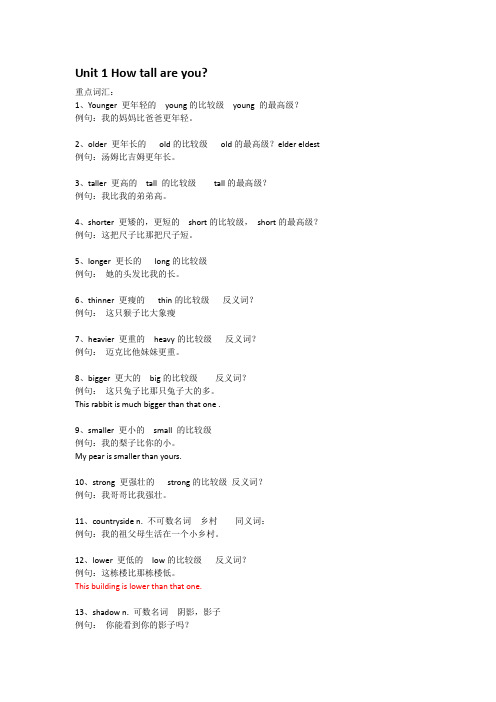
Unit 1 How tall are you?重点词汇:1、Younger 更年轻的young的比较级young 的最高级?例句:我的妈妈比爸爸更年轻。
2、older 更年长的old的比较级old的最高级?elder eldest 例句:汤姆比吉姆更年长。
3、taller 更高的tall 的比较级tall的最高级?例句:我比我的弟弟高。
4、shorter 更矮的,更短的short的比较级,short的最高级?例句:这把尺子比那把尺子短。
5、longer 更长的long的比较级例句:她的头发比我的长。
6、thinner 更瘦的thin的比较级反义词?例句:这只猴子比大象瘦7、heavier 更重的heavy的比较级反义词?例句:迈克比他妹妹更重。
8、bigger 更大的big的比较级反义词?例句:这只兔子比那只兔子大的多。
This rabbit is much bigger than that one .9、smaller 更小的small 的比较级例句:我的梨子比你的小。
My pear is smaller than yours.10、strong 更强壮的strong的比较级反义词?例句:我哥哥比我强壮。
11、countryside n. 不可数名词乡村同义词:例句:我的祖父母生活在一个小乡村。
12、lower 更低的low的比较级反义词?例句:这栋楼比那栋楼低。
This building is lower than that one.13、shadow n. 可数名词阴影,影子例句:你能看到你的影子吗?14、smarter 更聪明的smart的比较级例句:你变得越来越聪明了。
You are getting smarter and smarter.15、become v. 开始变得,变成例句:这个女孩想成为一名演员。
This girl wants to become an actress.重点短语:How tall 多高how heavy 多重how old 多大what size 多大号In this hall 在这个厅里both of 两个都over there 在那边have a look 看一看Go down 下降重点句型:①形容词的最高级:最高级通常用于3人或者3人以上的人或事物之间的比较。
六年级英语下册知识点总结

六年级下册知识点总结Unit 1 How Tall Are You?重点单词:Taller, shorter, stronger, older, younger, bigger, heavier, longer, thinner, smaller, funnier, meter, squid, lobster, shark, deep, seal, sperm whale, killer whale 重点句型:1-How tall are you?-I'm 1.60 meters tall/ I'm 160 cm.2-How heavy are you?-I'm 48 kg,-How long are your legs?-76 cm.4 -How big are your feet?-I wear size 17.5 -Who is taller than you?-Tom is taller than me.注:形容词比较级的变化规律:Unit2 What§The Matter,Mike?单词:重点Havea fever, hurt, have a cold, have a toothache, have a headache, have a sore throat, matter, sore, nose, tired, excited, angry, happy, bored, sad, medicine, a little, laugh at重点句型:1 -What's the matter with them?-The robot is tired, the stray man has a headache.-Fine. How are you?-I have a headache / fever / cold / toothache / sore throat.或have the flu.3 -What's the matter, mike?-I feel sick. I have a fever./ My throat is sore, my nose is hurt.4-How does Lisa feel?-She is tired/ sad/happy/excited.5-How are you, Liu Yun? You look sad.-I failed the math test.6-How do you / them feel? /How does he/she feel?-They feel happy./He/She feels happy.Unit 3 Last Weekend重点单词:Watch, wash, clean, play, visit, do, last, weekend, go, to, park, go to swimming, go hiking, go fishing, tongue twister, yesterday, return 重点句型:1-What did you do last weekend/yesterday?-I watched TV / washed the clothes/cleaned the room/played the football/visited grandparents/ played football/went to a park/went swimming/read a book/went fishing/went hiking/-Did you do homework yesterday?-Yes, I did./ No, I didn't.2-What did you do last weekend?-I V-ed……注:动词过去时的变化形式:1、一般情况下,动词词尾加-ed ,如:work ---worked play-played wanted--wanted act --- acted2、以不发音的-e结尾动词,动词词尾加-d,如:live-lived move——moved taste-tasted hope -hoped3、以辅音字母+y结尾的动词,把-y变为-i再加-ed,如:study-studied copy-copied cry-cried carry-carried4、以一个辅音字母结尾的重读闭音节动词,双写词尾辅音字母,再加-ed,如:stop —stopped5、不规则动词的过去式变化规律性不强,须多加记忆。
牛津小学英语六年级下册知识点总结(词组+句型)
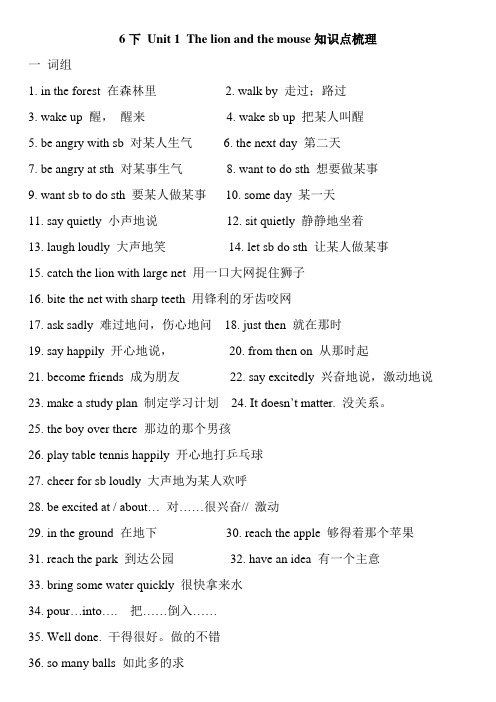
6下Unit 1 The lion and the mouse知识点梳理一词组1. in the forest 在森林里2. walk by 走过;路过3. wake up 醒,醒来4. wake sb up 把某人叫醒5. be angry with sb 对某人生气6. the next day 第二天7. be angry at sth 对某事生气8. want to do sth 想要做某事9. want sb to do sth 要某人做某事10. some day 某一天11. say quietly 小声地说 12. sit quietly 静静地坐着13. laugh loudly 大声地笑14. let sb do sth 让某人做某事15. catch the lion with large net 用一口大网捉住狮子16. bite the net with sharp teeth 用锋利的牙齿咬网17. ask sadly 难过地问,伤心地问18. just then 就在那时19. say happily 开心地说,20. from then on 从那时起21. become friends 成为朋友22. say excitedly 兴奋地说,激动地说23. make a study plan 制定学习计划24. It doesn’t matter. 没关系。
25. the boy over there 那边的那个男孩26. play table tennis happily 开心地打乒乓球27. cheer for sb loudly 大声地为某人欢呼28. be excited at / about… 对……很兴奋// 激动29. in the ground 在地下 30. reach the apple 够得着那个苹果31. reach the park 到达公园32. have an idea 有一个主意33. bring some water quickly 很快拿来水34. pour…into….把……倒入……35. Well done. 干得很好。
六年级下册英语必考知识点
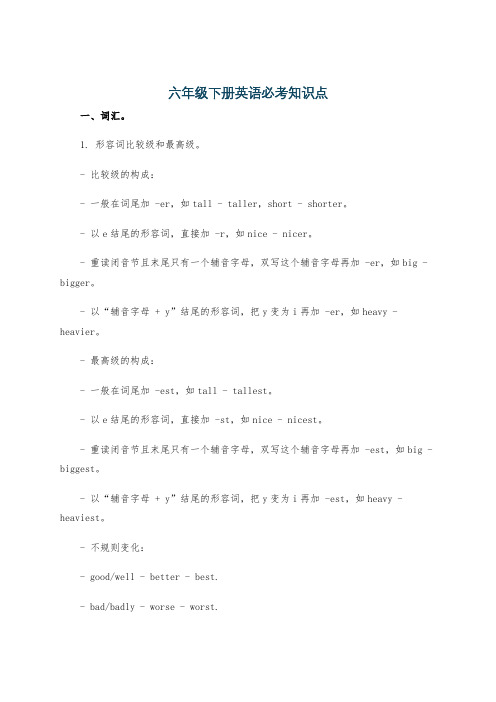
六年级下册英语必考知识点一、词汇。
1. 形容词比较级和最高级。
- 比较级的构成:- 一般在词尾加 -er,如tall - taller,short - shorter。
- 以e结尾的形容词,直接加 -r,如nice - nicer。
- 重读闭音节且末尾只有一个辅音字母,双写这个辅音字母再加 -er,如big - bigger。
- 以“辅音字母 + y”结尾的形容词,把y变为i再加 -er,如heavy - heavier。
- 最高级的构成:- 一般在词尾加 -est,如tall - tallest。
- 以e结尾的形容词,直接加 -st,如nice - nicest。
- 重读闭音节且末尾只有一个辅音字母,双写这个辅音字母再加 -est,如big - biggest。
- 以“辅音字母 + y”结尾的形容词,把y变为i再加 -est,如heavy - heaviest。
- 不规则变化:- good/well - better - best.- bad/badly - worse - worst.- many/much - more - most.- little - less - least.2. 动词的过去式。
- 规则变化:- 一般在词尾加 -ed,如play - played,clean - cleaned。
- 以e结尾的动词,加 -d,如live - lived。
- 重读闭音节且末尾只有一个辅音字母,双写这个辅音字母再加 -ed,如stop - stopped。
- 以“辅音字母 + y”结尾的动词,把y变为i再加 -ed,如study - studied。
- 不规则变化:- go - went.- see - saw.- eat - ate.- have/has - had等。
3. 重点单词。
- 职业类:doctor(医生),teacher(教师),pilot(飞行员),scientist (科学家),artist(艺术家)等。
部编版六年级英语下册必背必考知识点

部编版六年级英语下册必背必考知识点第一单元:动物朋友们1.1 单词1. zoo:动物园2. tiger:老虎3. elephant:大象4. monkey:猴子5. giraffe:长颈鹿6. lion:狮子7. seal:海豹8. panda:熊猫9. parrot:鹦鹉10. wild:野生的1.2 短语1. go to the zoo:去动物园2. a tall animal:一个高大的动物3. the biggest animal:最大的动物4. a small monkey:一个小猴子5. in the tree:在树上1.3 句型1. What's this?:这是什么?2. What's that?:那是什么?3. It's ...:它是...4. Do you like ...?:你喜欢...吗?5. Yes, I do./No, I don't.:是的,我喜欢./不,我不喜欢。
第二单元:我们的身体2.1 单词1. body:身体2. head:头3. eye:眼睛4. ear:耳朵5. nose:鼻子6. mouth:嘴7. arm:手臂8. hand:手9. leg:腿10. foot:脚2.2 短语1. head and shoulders:头和肩膀2. eyes and ears:眼睛和耳朵3. nose and mouth:鼻子和嘴4. arms and legs:手臂和腿2.3 句型1. I have ...:我有...2. He/She has ...:他/她有...3. Do you have ...?:你有...吗?4. Yes, I do./No, I don't.:是的,我有./不,我没有。
第三单元:颜色和形状3.1 单词1. red:红色2. yellow:黄色3. blue:蓝色4. green:绿色5. black:黑色6. white:白色7. purple:紫色8. orange:橙色9. round:圆的10. square:平方的3.2 短语1. red and yellow:红色和黄色2. blue and green:蓝色和绿色3. black and white:黑色和白色4. purple and orange:紫色和橙色3.3 句型1. What color is it?:它是什么颜色?2. It's ...:它是...3. What shape is it?:它是什么形状?4. It's ...:它是...第四单元:食物和饮料4.1 单词1. apple:苹果2. banana:香蕉3. orange:橙子4. grape:葡萄5. watermelon:西瓜6. pear:梨7. rice:米饭8. noodles:面条9. meat:肉10. egg:鸡蛋4.2 短语1. eat fruit:吃水果2. drink milk:喝牛奶3. have a meal:吃一顿饭4.3 句型1. What do you like?:你喜欢什么?2. I like ...:我喜欢...3. What do you want?:你想要什么?4. I want ...:我想要...第五单元:家庭和朋友5.1 单词1. father:父亲2. mother:母亲3. brother:兄弟4. sister:姐妹5. grandfather:祖父6. grandmother:祖母7. friend:朋友5.2 短语1. my family:我的家人2. your family:你的家人3. his family:他的家人4. her family:她的家人5.3 句型1. Who's this?:这是谁?2. Who's that?:那是谁?3. It's ...:它是...4. Is it ...?:它是...吗?以上是部编版六年级英语下册必背必考知识点的详细内容,希望对大家有所帮助。
六下英语必背知识点

下面是六年级英语必背的知识点:
1. 时态:掌握一般现在时、一般过去时和一般将来时的基本用法和句型结构。
2. 句型转换:能够进行句型转换,如陈述句变为否定句、疑问句等。
3. 数词:掌握基本的数字表示法和顺序词的用法。
4. 名词复数形式:掌握名词的复数形式及其规则。
5. 形容词比较级和最高级:掌握形容词比较级和最高级的构成规则和用法。
6. 物主代词:熟练使用物主代词及其所有格形式。
7. 情态动词:了解常见的情态动词,如can、could、may、might、must等的用法。
8. 动词的-ing形式:了解动词的-ing形式作主语、宾语、表语和定语的用法。
9. 名词性从句:理解名词性从句的概念和基本结构,并能正确运用。
10. 定语从句:了解定语从句的概念和基本结构,并能正确运用。
11. 简单的连词:掌握常见的连词,如and、but、or等的用法。
12. 日常交际用语:掌握简单的日常交际用语,如问候、道歉、感谢等。
以上是六年级英语必背的知识点,通过对这些知识点的掌握和运用,可以提高英语水平并顺利完成相关考试。
六年级下英语知识点总结

六年级下英语知识点总结导读:一、单词young— younger更年轻的 old -older更年长的 tall- taller 更高的short-shorter更矮的 long-longer更长的 thin-thinner更瘦的heavy-heavier更重的 big-bigger更大的 small -smaller更小的`strong -stronger更强壮的二、句子1. That's the tallest dinosaur in this hall. 那是这个厅里最高的恐龙。
2. You're older than me.你比我大。
3. How tall are you? 你有多高? I'm 1.65 meters.我身高1.65米。
4. What size are your shoes?你穿多大号的鞋。
5. My shoes are size37.我穿37号的鞋。
6. Your feet are bigger than mine.你的脚比我的大。
7. How heavy are you?你有多重?8. I'm 48 kilograms.我体重48公斤。
三、语法复习要点:形容词的比较级1、形容词比较级在句子中的运用:两个事物或人的比较用比较级,比较级后面一般带有单词than。
than后的人称代词用主格(口语中可用宾格)。
2.形容词加er的规则:⑴一般在词尾加er ;⑵以字母e 结尾,加r ;nice---nicer⑶以一个元音字母和一个辅音字母结尾,应双写末尾的辅音字母,再加er ;big--- bigger thin---- thinner⑷以“辅音字母+y”结尾,先把y变i,再加er 。
heavy----heavier3.不规则形容词比较级: good/well-better例句:(1).It's taller than both of us together.它比我俩加起来还高。
1_六年级下册英语知识点
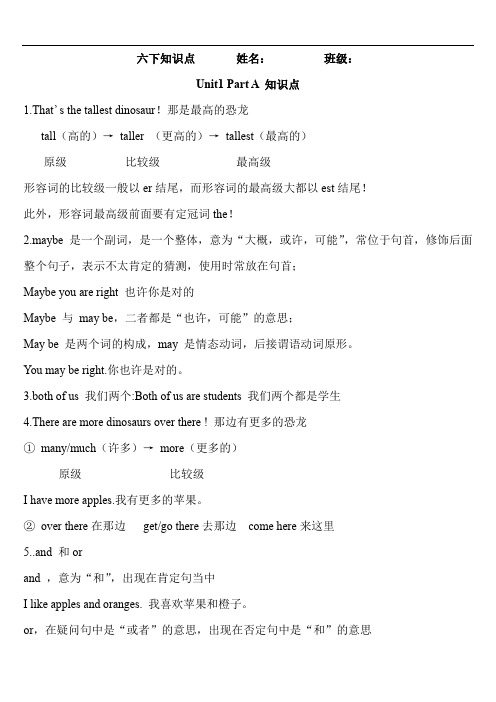
六下知识点姓名:班级:Unit1 Part A 知识点1.That’ s the tallest dinosaur!那是最高的恐龙tall(高的)→taller (更高的)→tallest(最高的)原级比较级最高级形容词的比较级一般以er结尾,而形容词的最高级大都以est结尾!此外,形容词最高级前面要有定冠词the!2.maybe是一个副词,是一个整体,意为“大概,或许,可能”,常位于句首,修饰后面整个句子,表示不太肯定的猜测,使用时常放在句首;Maybe you are right 也许你是对的Maybe 与may be,二者都是“也许,可能”的意思;May be 是两个词的构成,may 是情态动词,后接谓语动词原形。
You may be right.你也许是对的。
3.both of us 我们两个:Both of us are students 我们两个都是学生4.There are more dinosaurs over there ! 那边有更多的恐龙①many/much(许多)→more(更多的)原级比较级I have more apples.我有更多的苹果。
②over there在那边get/go there去那边come here来这里5..and 和orand ,意为“和”,出现在肯定句当中I like apples and oranges. 我喜欢苹果和橙子。
or,在疑问句中是“或者”的意思,出现在否定句中是“和”的意思What fruit do you like,apple or orange?你喜欢什么水果?苹果或者橙子?I don’t like apple or orange. 我不喜欢苹果和橙子。
Unit1 Part B 知识点1.Those shoes in the window are nice!在窗户里的那些鞋子是很漂亮的!①those(那些)→ that (那个)these(这些)→ this (这个)this,that,these,those是指示代词,它们既可以充当形容词,也可以充当名词;① those shoes in the window 窗户里的那些鞋子in the window是介词短语shoes 是整个句子的主语!2.let ’s have a look!让我们看一看!①Let ’s = let us 让我们,Let sb do sth 让某人做某事Let me sing a birthday song for you 让我为你唱一首英文歌!①have a look看一看,have a try试一试,have a rest休息一下,have a walk散散步3.I wear size 38 shoes. 我穿38码的鞋子① 提问:What size are your shoes?你的鞋子是什么码数的?I wear size 38 我穿38码的What color is it?它是什么颜色?What time is it now?现在是什么时间?① wear,动词,意为“穿(衣服);戴(眼镜);留(长发))”等She is wearing a red skirt today. 她今天穿着一件红色的短裙。
- 1、下载文档前请自行甄别文档内容的完整性,平台不提供额外的编辑、内容补充、找答案等附加服务。
- 2、"仅部分预览"的文档,不可在线预览部分如存在完整性等问题,可反馈申请退款(可完整预览的文档不适用该条件!)。
- 3、如文档侵犯您的权益,请联系客服反馈,我们会尽快为您处理(人工客服工作时间:9:00-18:30)。
六年级英语下册知识点梳理一、单元内容简析:Unit 1 How tall are you?本单元内容的中心话题是询问人或事物的年龄、身高、重量以及长度并作比较。
内容涉及恐龙、猴子以及鲸类的比较,学生之间在年龄、身高和体重方面的比较。
二、单元词、句、语法等方面的知识重点:四会单词三会单词词二会单知词短语语法词法汇识taller,shorter,stronge,older,younger,bigger,funnier,heavier,longer,thinner,smaller(重点)little,tail,think,size,wear,yourscm(centimeter),than,funnier,kg(kilogram),feet,meter,ton,each,squid,lobster,shark,deep,seal,evensperm whale,killer whale,up to,dive into,good swimmer,the length of, line up,from to形容词比较级的变化规则:1、直接在形容词后加“er” , 例如 long---longer, tall---taller 。
2、以字母“ e”结尾的直接加“r”,例如nice---nicer 。
3、重读闭音节只有一个辅音字母结尾的,双写最后一个辅音字母后再加“er”, 例如thin---thinner,big---bigger 。
4、辅音字母加“y”结尾的先把“y”改为“ i”再加“ er”,例如 funny---funnier,heavy---heavier 。
5、部分双音节或多音节加“more”,例如 careful---more careful 。
6、不规则变化,例如good---better 。
句句型1、How +形容词+be+主语? 2、A+比较级+than +B.3 、主语+be+数字+单位+tall/heavy/long ,四会How tall are you?I ’m 164cm tall. Y ou are shorter than me. Y ou are 4cm taller子than me. How heavy are you?I ’m 48kg. I ’m thinner than you,and shorter(.重点)三、本单元难点:1、数字的读法,含有“厘米、千克”单位的读法。
如百以上 164:one hundred and sixty-four,学生可能读的时候百后不知加“and”,还有千的读法:thousand小,数的读法等。
2、形容词比较级的用法与变化形式,哪些要双写,哪些要把y 变 i 成再加er,到底在什么情况下变比较级要加上more。
3、代词的用法,特别是名词性物主代词的用法。
四、易考点与易错点:1、词语类:①四会词语在听力部分听写或笔试部分按照汉意写词语。
②按要求写词语:变比较级 funny,heavy,big,thin;long 的名词,foot,tooth 复数,heavy(heavier)的反义词 light(er)③very 修饰原级, much 修饰比较级。
例如: He is very tall. He is much taller than you.2、语法、句型类:①H ow 引导的不同特殊疑问句:How be sb.?(问某人状况),H ow tall/heavy/old be sb./sth?(询问身高、体重、年龄)H ow long/big/large be---?(问多长、多大)How many/much(问数量、价格)。
②比较级的运用,一定要是相同内容或类别才可以进行比较,这是学生最易出错和混淆娥地方。
例如:Mike’s legs are longer than (John),如果学生翻译会直接填写John,但是一分析就不难发现应该和John的腿作比较的,所以应该是John’s。
再比如 My hair is是填 hers才是longer than (she).如果不仔细分析大多数学生都会错填成:she,her但,正确的。
Unit 2 What ’s the matter,Mike?一、单元内容简析:本单元的教学内容主要是围绕“看病就医”和“描述心情”两个话题展开。
二、单元词、句、语法等方面的知识重点:单hurt,matter,sore,nose,tired,excited,ang,r h y appy,bored,sad(重点)四词会短have a fever,have a cold,have a headache,have a sore thr(oa重t 点)词语三单people,know,pass,guess,game会词单feel,sick,flu,might,worry,medicine,drink,stay,better,soon,trip,fail,test,hear,match,be二词tween,kick,goal,another,win(过去式 won)a little,laugh at,feel sick,broken leg,have/get the flu,don’t worry ,see a doctor,take汇短some medicine,drink hot drinks,stay in bed for a few days,feel better,look so会语happy,go on a big trip,fail the math test, at the end ofa footballmatch,between---and---,pass---to---,kick the ball,fly into,bounce off时态一般现在时:(注意主语是第三人称单数的句子)句句式How+助动词+主语+动词原形? 主语+ have/has +疾病类单词子四会What’s the matter with you?/What’s wrong with you? My nose is sore. My nose hurts. How are you? Y ou look so happy. You look sad today.(重点)三、难点是学生能在各种语言环境中正确熟练地运用不同句型进行交流。
四、易考点与易错点:1、词语:①四会词语和短语会出现于听力部分的补全句子或按汉语意思翻译。
②了解“疼痛”的区别: hurt 是动词指“使受伤”,ache是名词后缀 ,加上身体某部位常指某部位疼痛, sore是形容词可以放在表示身体某部位的词语前作定语或放在be 动词后做表语。
hurt 和sore有时可以替换。
armache,stomachache I hurt my nose. My nose hurts.My nose is sore.②注意people是集合名词,单数和复数同形;medicine 是不可数名词,没有复数形式。
③短语“为某人买某物”,buy sb. sth./buy sth.for sb.当某人放在前面时不用加for,否则要加介词 for. buy me a ball, buy a ball for me ④ be going to 后跟动词 ,be going on 后跟名词,表示将要或打算做什么事情。
2、句型:①What’s wrong with you? 和 What’s the matter with you?意思和用法相同, matter名词要加,而wrong 是形容词,常在选择和改错题中出现。
②注意当主语是第三人称单数的时候,如果没有be 动词,谓语动词要加s 或 es,否定句和疑问句要用does。
Mike has(have) a headache. How does(do) your father feel? He doesn’t (not) feel well.Unit 3 Last Weekend一、单元简析:本单元主要是学习和运用一般过去时来表达在过去的时间内所做的事情。
二、单元词、句、语法等方面的知识重点:四会单词watch----watched,wash----washed,clean----cleaned,play -------------- playedvisit----visited,do----did,go----went,read --------- read,last,weekend,park 词(重点)短语go swimming,go fishing,go hiking (重点)知三会单词cook----cooked,study studied汇二会单词yesterday,return,fly---flew,swim ------ swam短语tongue twister时态一般过去时识句式或句型1、主语+动词过去式+过去时间.句2、What+d id+主语+ do+过去时间? 3、Did+主语+动词原形+过去时间?四会句子What did you do last weekend? I played football.点Did you read books? Y es, I did. No, I didn ’t. (重点)子三会句子I visited my grandparents.What did you do yesterday? I went hiking.一般过去时态的构成动词肯定式否定式一般疑问句I was--- He/She/It was--- We/You/They were--- I was not(wasn’t)--- He/She/It wasn’t---We/Y ou/They/werenot(weren’t)Was he/she/it---? Wereyou/they---?实意I/He/She/It+动词过去式动词We/You/They +动词过去式I/He/She/It+ didn’t+动词原形We/You/They +didn’t+动词原形Did he/she/it+动词原形 ? Didyou/they +动词原形 ?be三、难点:1、了解一般过去时态的意义和用法。
2、动词过去式的变化规则: A 规则变化①一般在动词原形末尾加ed。
②动词原形词尾是字母e 的直接加 d。
③末尾只有一个辅音字母的重读闭音节词,先双写这个辅音字母,再加 ed。
④动词结尾是辅音字母加y,把y 变为i 再加ed。
B 不规则变化:要求背诵记忆。
3、规则动词过去式的读音:①清辅音后面读 /t/;②元音和浊辅音后读/d/;③在 /t/和/d/音后读/id/。
